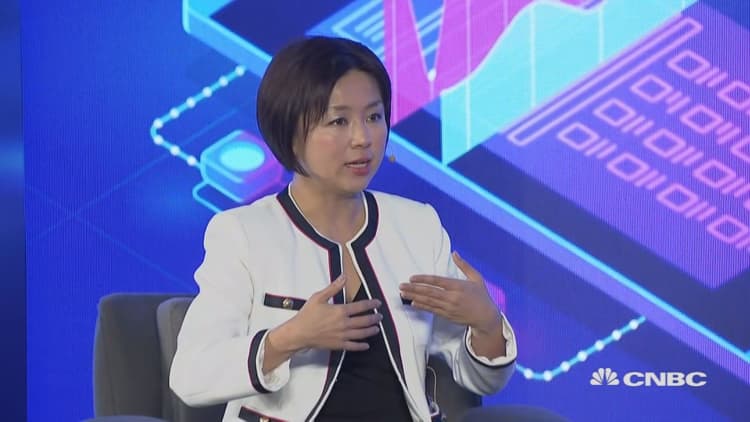Just over 1.4 billion people live in China. That's a fifth of the world's population and four times as many people as the United States.
A vast number of them are sharing medical records, paying for meals and accessing bank accounts through technology on a daily basis, on scale not seen in Europe or the U.S.
A number of CEOs, investors and top tech leaders at CNBC's East Tech West conference this week have cited one common theme that binds them all: data is today's gold, more so in China than anywhere else.
China's edge in the tech race is vast amounts of data and, more importantly, the willingness of its public to share it.
"China is so interesting because there is so much data," said Edith Yeung, head of 500 Startups' China unit.
"I think there are a lot of Chinese citizens really proud of the fact that we're actually big enough to even be able to compete with the U.S. in terms of AI. And I think it is just a really exciting time to be in China."
She suggested that this willingness from the Chinese public will aid data-hungry firms that are looking to enhance and launch new AI projects.
China's tech firms, big and small, are capitalizing on this gold mine of data. Russ Shaw, the founder of tech association Tech London Advocates and Global Tech Advocates, told CNBC via email that China is collecting "unprecedented amounts of data, unlike anything we are seeing in Europe and the U.S. The combination of advanced technology and government backing has allowed the country to harness the power of its enormous population."
This has shaped public attitudes in China that are somewhat different to those in the West. Holly White, a former U.K. civil servant in Beijing and now a senior consultant with international IP consultancy Rouse, told CNBC in an email that established "social structures" have led China's citizens to "accept a blurred line between private and state involvement in their lives."

China's government has been slowly rolling out guidelines on a digital social-credit system that would rank citizens behavior to give them a "social" score, in a similar method to analyzing and rewarding financial credit. The database is reportedly set to be in place nationwide by 2020 with around 30 local authorities already collecting data.
"These mass data operations have proved beneficial in a number of areas, none more so than in China's capacity to develop cutting-edge fintech and artificial intelligence. The government has also been quick to realize the potential of Big Data, fueling its smart cities program, and using the information to improve energy efficiency and health standards by reducing pollution levels," Shaw said.
"People have less inhibitions in sharing personal data, especially when it is seen to benefit their lives or enable them to utilize new innovations," White added.
Facial recognition
Chinese consumers have been speedy adopters of the latest technology thanks to platforms giving access to a wide range of services, from payments to targeted food menus, based on historical data collected by tech firms. China has also adopted facial recognition software for everyday life.
The technology has been used for everything from helping police identify and arrest a fugitive in a crowd of 50,000 in southeast China to AI firms publicly displaying the faces of jaywalkers on large LED screens. According to global accounting firm EY, over 1,000 brands across 100,000 locations in China have used features including facial recognition or gamification to engage customers in stores. KFC China launched a "smile to pay" facial recognition system for customers to order food in September 2017 with the help of internet search engine Baidu.
Baidu is currently experimenting with AI, but its humble beginnings reveal how early players grabbed a stranglehold on data dominance. Back in 2000, venture capitalist Jixun Foo invested in Baidu, which has now evolved into China's largest search engine.
"When I invested in Baidu in 2000, I wasn't sure where Google was. I thought it was B2B (business-to-business) services. I said information services had demand and that search has value. That is the underlying thesis," Jixun said at the East Tech West summit.
China's tech landscape has morphed considerably since, boasting the world's biggest technology companies, including e-commerce giant Alibaba, Tencent with its WeChat app registered with 1 billion users, alongside Baidu. All three internet behemoths have grown so big that they now dominate every aspect of China's tech landscape with investments ranging from e-gaming, driverless cars and media companies.
According to the China Internet Report, created by 500 Startups' Yeung, Alibaba, Tencent and Baidu have invested in over 400 companies combined. That means almost all the big data is controlled by industry heavyweights, making it very difficult for small start-ups to get hold of that data.
Xin Song, founder of an AI-focused blockchain platform called Bottos, told CNBC's Arjun Kharpal that the solution to breaking that stranglehold and providing data privacy could be in blockchain.
"With blockchain technology… people can provide those data, and with the traceability and the transparency of the data usage in the future, people in the world and people in the blockchain community (will be) willing to contribute their individual data."




